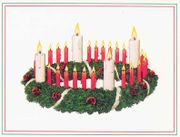Philippians 4:4
16/12/2018
Rejoice in the Lord always, again I will say, Rejoice!
Rejoice! This building was built 40yrs ago for God’s people and dedicated to the glory of Jesus Christ, not only that, but also His people have been here all those 40yrs. And Thank God for that! We are celebrating 40yrs of God’s grace to His people from this building by His marvellous Words and His mysterious Sacraments. That is a wonderful thing, but what about know? What is God doing here, will this building be here in another 40yrs? What has happened to all those people who grew up here, were baptised here in this building? Where is the future of this building and what is the future of our congregation?
That is a wonderful thing, but what about know? What is God doing here, will this building be here in another 40yrs? What has happened to all those people who grew up here, were baptised here in this building? Where is the future of this building and what is the future of our congregation?
This congregation, St Mark’s, this parish is not growing. It’s seen times when there were many more people here than there are now, some have died in Christ and now know that hope which we all have as followers of Christ, some have moved for work or family to other congregations in our LCA, some have given up on the faith and others have left for other reasons. This congregation is struggling, and some might say it is even dying.
Maybe you too are feeling that struggle in your own life and are looking for answers. Where can we look to for help? To Jesus Christ and God our Heavenly Father through the strength of the Holy Spirit. Here in His Word we hear from Paul in his letter to the Philippians. Another person just like anyone of us, saved by Christ, but also struggling with sin and the evil of this world. Now he wants to see the Philippians, but as this letter is written, he can’t; Paul is in prison in Rome where he would eventually be killed (Philippians 1:7-14). He struggled much in his life after seeing Jesus, rejected by the Jews, his people, beaten, imprisoned, stoned even. He was struggling, coming closer and closer to death. But he does not despair.
He knows something. He knows what Jesus has done for him and for you. That He has come down to our level to take care of everything that ultimately threatens us, to take your sin away, to give you life vastly stronger than death, to free you from Satan his lies and accusations, and to restore your relationship with God Almighty your heavenly Father in Christ. Paul also knew that all the things he could do, all the good, are as nothing compared to the brilliant, wonderful and utterly amazing knowledge of Jesus Christ the Lord (Philippians 3:7-8). Compared to all those things that God has given us through Jesus and for the sake of His ministry, His suffering, death and resurrection. That we are now righteous and holy, not of ourselves but of God, that comes through faith in Jesus Christ. Paul knew the power of the resurrection, life eternal, forgiveness and freedom in Christ, and also he shared Jesus Christ’s suffering in this world. Paul knew that God Almighty was by his side and throughout everything that happened to him, he let his requests be made known to God by prayer with thanksgiving. He held fast to the joy we all have in Christ Jesus.
Our present sufferings are nothing compared to the joy of Jesus that will be revealed in us in the end (Romans 8:18-24). That joy and peace that we celebrate with the first coming of Jesus as a baby, that wonder that Mary knew when the shepherds came praising God in her child, then the wise men with their gifts, that experience that many of you have had perhaps through answered prayer or studying and thinking on the scriptures, even receiving forgiveness at the absolution or through Christ’s body and blood. Thank God that we can experience His love and mercy today. But even those wonderful and comforting times are just a foretaste of the things to come. And thank God that He has given us such a marvellous hope.
Your heavenly Father, God Almighty, has promised you that He can and will raise you from death into new eternal life in Jesus. Thank the Lord. He has given and sustained this congregation through the years with this building. Again thank the Lord of Heaven. When you are struggling He hears your cries for help, He will not abandon you but He will get you through. Thanks be to God. For all that He has done for you, give Him thanks. But not only that, continue to give thanks to Him and to rely on Him in the good times and the bad, because He loves you and will continue to walk alongside you. And don’t just thank Him for the good things that happen to you, thank Him and rejoice in everything just like Paul, be content (Philippians 4:11-13). Thank Him for the suffering you experience in this life, in it you are following Jesus; and thank Him for all the challenges and difficulties, they are more opportunities to rely on God’s strength and shine Christ’s light into this weary world. You have all that you need in Christ already, you are forgiven, you have eternal life, you are free from the power of sin and death. Thank God.
This isn’t a command, as if you must say ‘thank God’ 10 times a day and then you will get blessings and salvation. But rather I’m encouraging you and reminding you with Jesus’s words through Paul, that there is nothing to worry about, you don’t need to be pulled in all sorts of directions, to be anxious (Philippians 4:6). Paul is giving you some great wisdom here, to recognise that you have all you need, that God Almighty, your Heavenly Father, has given it to you; just like Christ giving you His body and blood through the pastor and the bread and wine. And this doesn’t mean that we just give up on life because we have all we need, rather in our thanksgiving we can respond to God’s love, and do what is pure, honourable, just, lovely, commendable and excellent (Philippians 4:8-10). Rejoice in the Lord always, as Paul writes earlier, to say the same things to you is no trouble to me and is safe for you (Philippians 3:1). Rejoice that you have your congregation, Rejoice that you live where you do, Rejoice that you have family, Rejoice that you know the people you do, yes even that person, Rejoice that you are in pain, Rejoice that this world is against you, even sometimes your own body, Rejoice that you have all these opportunities to practise what you believe, to rely on God’s strength and not your own. And Rejoice that Jesus saves and sustains you, that in the end in Christ we will be free from all the evil and sin and corruption, and with thanksgiving continually ask Him for help. I know I need it, and I know He will give it. Amen
Rev. Joseph Graham



